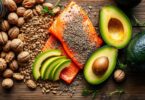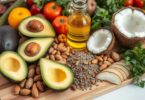Fat-Rich Foods: Healthy Sources of Dietary Fats
Are you tired of thinking all fats are bad? Get ready to see the truth about fat-rich foods and their role in a healthy diet. We’ll dive into the heart-healthy benefits of avocados and the many uses of nuts and nut butters. This article will show you why adding healthy fats to your diet is key.
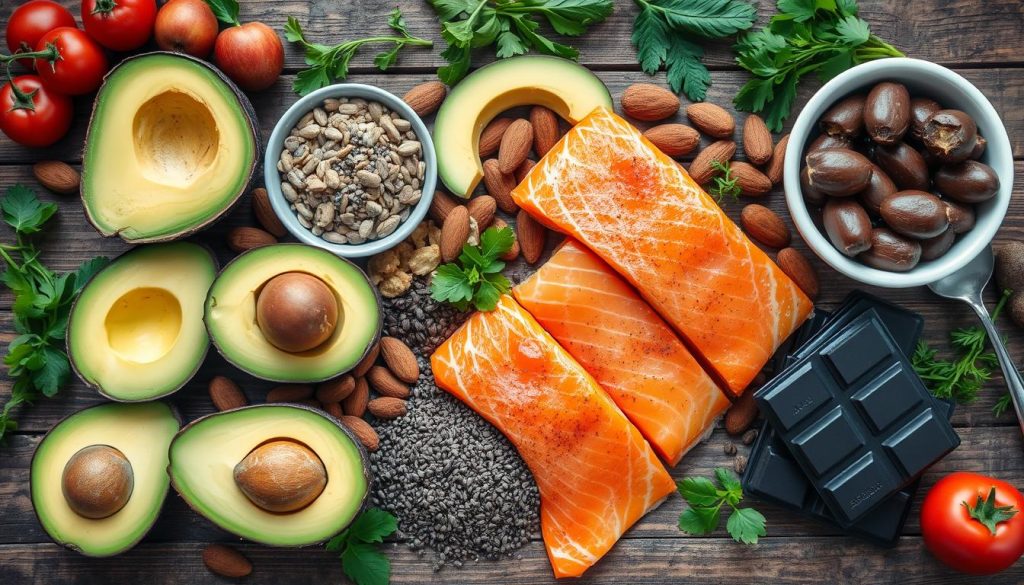
Key Takeaways
- Healthy fats, like monounsaturated and omega-3 fatty acids, are vital for our health and well-being.
- Foods rich in nutrients, such as avocados, nuts, and fatty fish, are great sources of these fats.
- Eating fat-rich foods can help your heart, brain, and even help with weight management.
- It’s important to know the difference between good and bad fats to make smart food choices.
- Discovering the many uses of fats like olive oil and coconut oil can open up new flavors and healthy dishes.
The Importance of Healthy Fats
Fats are key to a balanced diet, giving us important nutrients and energy. But, not all fats are good for us. Knowing the difference between healthy fats and unhealthy fats helps us make better food choices.
Understanding the Role of Fats in a Balanced Diet
Healthy fats, like omega-3 fatty acids and monounsaturated fats, are vital for health. They help fight inflammation, support brain health, and lower heart disease risk. Adding these healthy fats to our diet can greatly improve our health.
Distinguishing Between Healthy and Unhealthy Fats
Unhealthy fats, such as saturated fats and trans fats, harm our health. They can raise cholesterol levels, increase heart disease risk, and cause weight gain. It’s important to cut down on these unhealthy fats and choose healthy fats instead.
Learning about healthy fats and unhealthy fats helps us make better food choices. This knowledge lets us feed our bodies the nutrients they need to stay healthy.
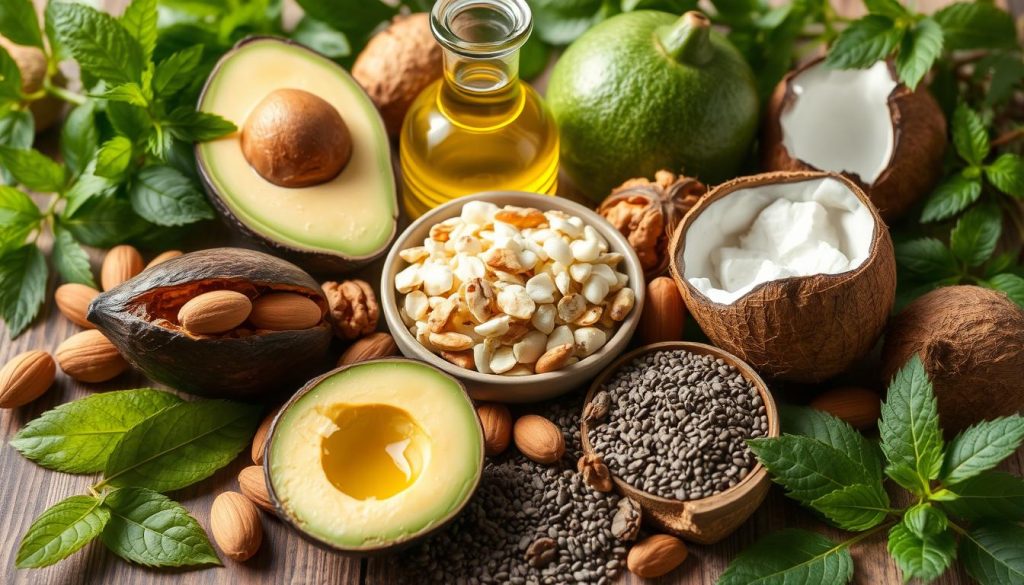
“Incorporating healthy fats into your diet is not only delicious but also vital for your overall well-being.”
Avocados: A Powerhouse of Monounsaturated Fats
Avocados stand out for their monounsaturated fats. These nutrient-dense fruits are great for your heart and blood sugar. They’re a key part of a healthy eating regimen.
Avocados are full of healthy fats and essential omega-3s. These fats are good for your heart. They help lower bad cholesterol and raise good cholesterol.
Avocados also have antioxidants that protect your body. Their healthy fats can help control blood sugar. This makes them perfect for a balanced diet.
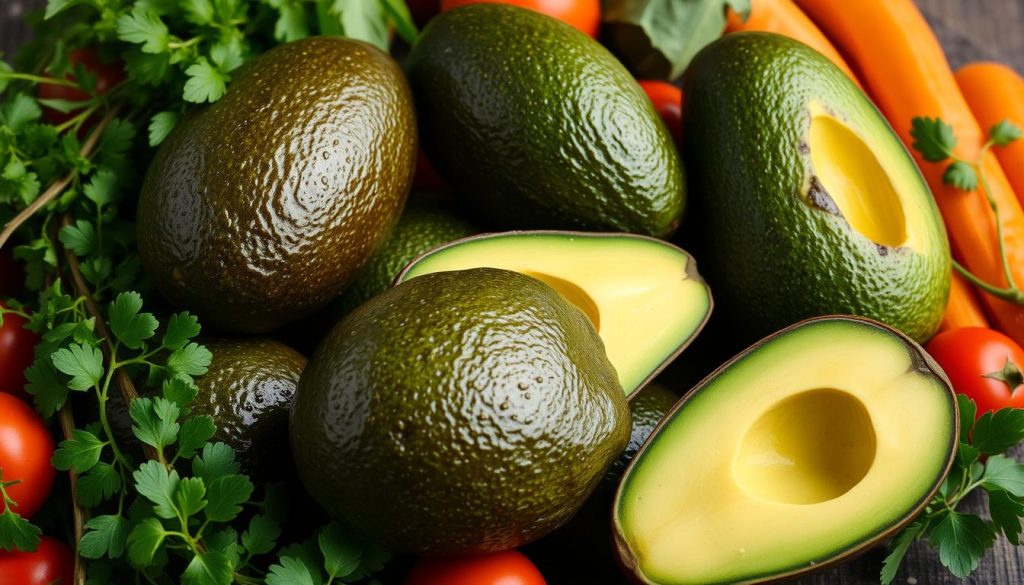
“Avocados are a true powerhouse of health, offering a delicious and satisfying way to incorporate healthy fats into your diet.”
Avocados are great for your heart and blood sugar. They’re also a tasty, creamy addition to meals. Add them to your daily routine for many health benefits.
Fat-Rich Foods: Nuts and Nut Butters
Nuts and nut butters are packed with healthy fats. They are great for any diet. You can find almonds, peanuts, walnuts, and cashews in stores. Each type has its own mix of fats and nutrients like protein and fiber.
A Versatile Addition to Any Diet
Nuts and nut butters are full of healthy fats. They are perfect for adding to many dishes. You can use them to make salads crunchier, smoothies creamier, or baked goods more satisfying.
Exploring Different Nut Varieties
- Almonds are rich in monounsaturated fats and vitamin E.
- Peanuts are a type of legume that offer a similar nutrient profile to tree nuts, with a balance of healthy fats, protein, and fiber.
- Walnuts are a prime source of omega-3 fatty acids, which are important for brain and heart health.
- Cashews are creamy and delicious, with a high content of magnesium and copper.
Try different nuts to find your favorites. Each has its own taste and health benefits.
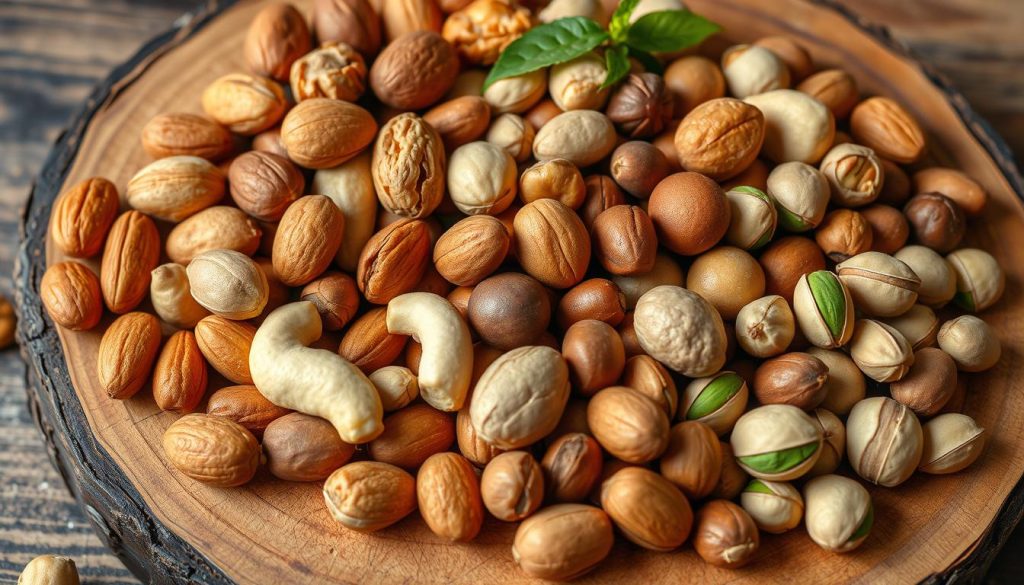
Olive Oil: The Mediterranean Superfood
Olive oil is a key part of the Mediterranean diet. It’s rich in monounsaturated fats and antioxidants. This makes it a great choice for cooking and keeping your heart healthy.
Benefits of Extra Virgin Olive Oil
Adding extra virgin olive oil to your meals can be very beneficial:
- It helps keep your heart healthy by improving cholesterol levels and lowering heart disease risk.
- It has anti-inflammatory effects that can ease symptoms of chronic conditions.
- It’s packed with antioxidants that protect cells and boost overall health.
- It adds flavor and texture to many dishes, making it a must-have in the kitchen.
“Olive oil is the foundation of the Mediterranean diet, which has been linked to numerous health benefits, including reduced risk of heart disease, type 2 diabetes, and certain types of cancer.”
Olive oil, especially extra virgin olive oil, is a true Mediterranean superfood. Its nutritional value and versatility in cooking make it a standout choice for health and flavor.
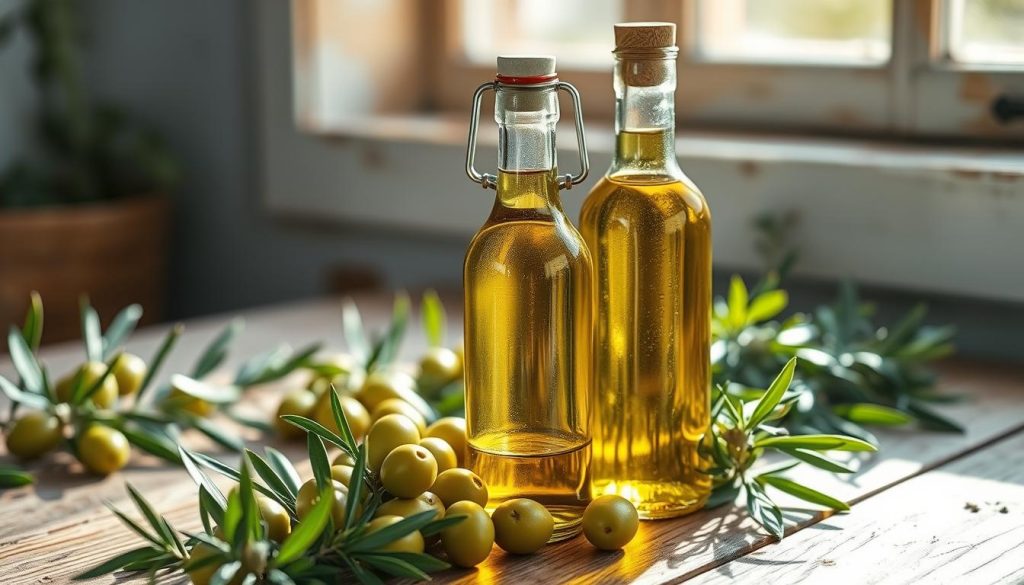
Fatty Fish: A Bountiful Source of Omega-3s
Fatty fish are a great choice for adding healthy fats to your diet. Seafood like salmon, mackerel, sardines, tuna, and herring are full of omega-3 fatty acids. These fats are good for your heart, brain, and help reduce inflammation.
Omega-3s, especially EPA and DHA, are key for our health. Studies show eating fatty fish can lower heart disease risk. Omega-3s help with blood pressure, triglycerides, and body inflammation.
Omega-3s in fatty fish also support brain health. They’re important for brain development and function. Research suggests they may help with depression and other mental health issues.
Adding fatty fish to your meals is a smart move. Choose grilled salmon, baked mackerel, or canned sardines. You’ll get a lot of omega-3s and boost your health.
“Eating fatty fish at least twice a week is one of the best dietary strategies for increasing your omega-3 intake and improving your health.”
Remember to include fatty fish in your meal planning. They offer heart and brain benefits. From salmon to tuna, they’re tasty and good for you.

Coconut Oil: A Versatile Fat-Rich Superfood
Coconut oil is a superfood known for its unique nutritional profile. It’s rich in medium-chain triglycerides (MCTs) and lauric acid. These components offer health benefits, making it great for any diet or self-care routine.
The Benefits of Coconut Oil
Coconut oil is famous for its antimicrobial properties thanks to lauric acid. It helps support the body’s natural defenses and promotes wellness. The MCTs in coconut oil also boost metabolism and energy levels.
- Supports a healthy immune system
- Boosts metabolism and energy
- Moisturizes and nourishes skin and hair
Cooking and Baking with Coconut Oil
Coconut oil is also great for cooking and baking. Its high smoke point allows it to handle high temperatures well. This keeps its nutritional value intact.
- Use coconut oil for sautéing, roasting, and stir-frying
- Substitute coconut oil for butter or other oils in baked goods
- Incorporate coconut oil into homemade granola, energy bars, and other healthy snacks
Looking to improve your health or cooking skills? Coconut oil is a fantastic choice. It’s a fat-rich superfood that should be in your pantry.
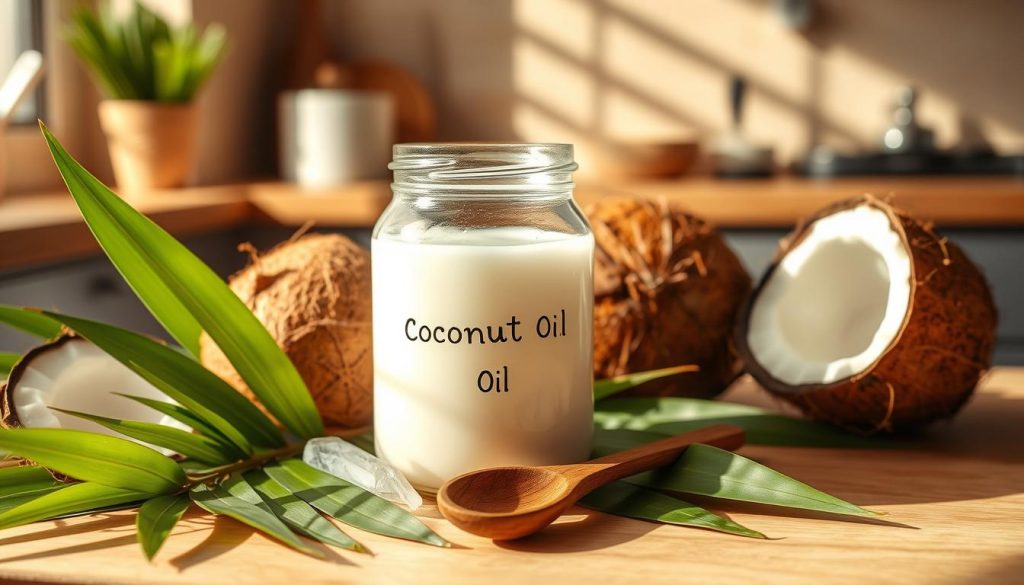
Conclusion
Including healthy fats from different fat-rich foods is key for a balanced diet. Foods like avocados, nuts, olive oil, and fatty fish are great choices. They help keep you healthy and offer many benefits.
It’s important to choose unsaturated fats over unhealthy, saturated fats. Eating a variety of healthy fats can make your diet more balanced. This supports your health and energy levels.
By picking the right foods, you can improve your health. Focus on nutrient-dense foods with healthy fats. This will help you feel better and live a healthier life.




